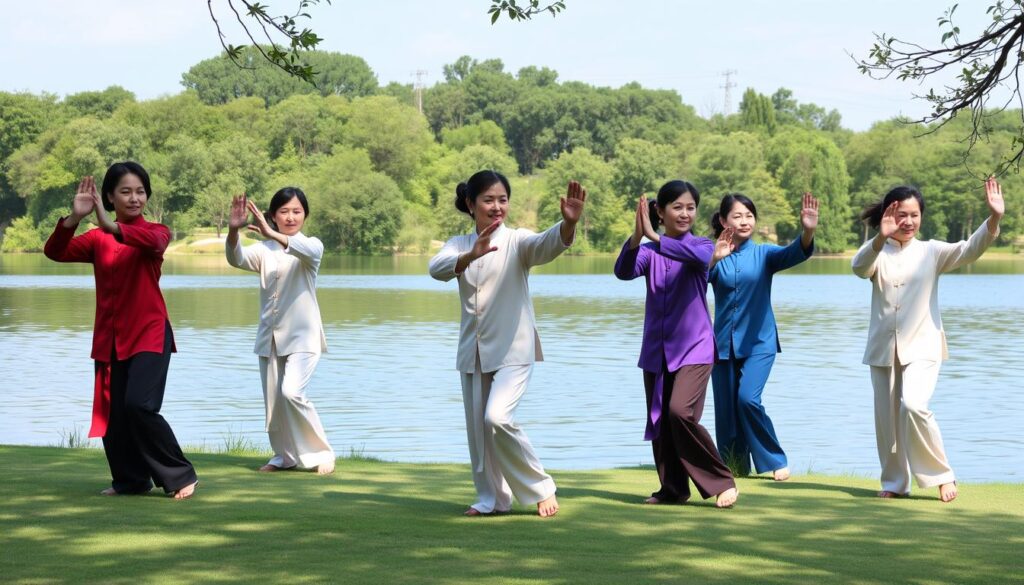Tai Chi is increasing in popularity in the Western world, after having crossed the Pacific Ocean where it originated in traditional Chinese medicine. Because it has centuries of success behind it, many people take it for granted that it works to improve health. However, scientists in the Western world prefer to do research studies in order to show the advantages or disadvantages of a particular health-related treatment. Fortunately, modern science has investigated the benefits of Tai Chi by performing studies that can show whether Tai Chi is helpful for those who have various medical ailments.
The Scientific Review
A comprehensive research review (Roger Jahnke et al) published on the National Center for Biotechnology Information website looked at the advantages of Tai Chi in managing several medical conditions, including arthritis, hypertension, heart disease, certain cancers, balance, and flexibility, immunity, and stroke rehabilitation.
The review article looked at the results of 158 articles that all looked at the benefits of Tai Chi when it comes to physiological and psychological health. When the worst studies were weeded out of the review process, a total of 6410 individuals were included among 77 remaining studies. Most studies compared Tai Chi or Qigong as they related to health and used the lack of doing any type of energy-related healing as a control factor.
Some of the participants were healthy while others suffered from some of the typical things Tai Chi is noted to help—namely arthritis, heart disease, osteoporosis, depression and fibromyalgia.
Study Findings On Tai Chi And Health
The findings were remarkable.
For example, because Tai Chi was able to exercise the individual without putting stress on the joints, it was found to decrease joint pain and improve bone density, thus diminishing the risk of fracture after a fall.
Many studies regarding Tai Chi and cardiovascular health showed a decreased incidence of heart and lung problems in patients who practiced Tai Chi as opposed to sedentary people.
Blood pressure improvement was noted in these studies and participants of Tai Chi had lower heart rates. The various biomarkers of heart healthiness were found to be better in those who practiced Tai Chi. The benefits of Tai Chi seemed to be more preventative for heart disease than it was for treating already established disease. This fits with the Traditional Chinese Medicine models of prevention verses treating disease that has already occurred.
Tai Chi And Obesity
Tai Chi was found to reduce the body mass index, which is a measure of how obese a person is. Because Tai Chi involves moderate exercise, it is likely that it works by burning excess calories and by keeping the metabolic rate up, which also burns calories, even at rest.
Physical Functioning And Tai Chi
Tai Chi was able to improve several measures of physical functioning, especially in the elderly. Patients had better grip strength, walked better, and tested better on measures of physical endurance, strength, and fine motor movements.
Again, people improved to a greater degree when they were healthy when compared to those individuals who already had multiple medical problems. Things like falls and poor balance were markedly improved in those people who were at risk for falls.
Quality Of Life Outcomes
Researchers looked to see whether Tai Chi improved quality of life among healthy people as well as people who had physical ailments.
Adults who practiced Tai Chi felt more confidence in trying out new behaviors and were less fearful of falling.
People practicing Tai Chi did not suffer as much pain from fibromyalgia and therefore felt a better quality of life.
Stress was lessened in people who practiced Tai Chi.
Psychologically, people who practiced Tai Chi were able to have a lesser degree of depression, phobias, anxiety and showed a better self-esteem.
Profiles on overall psychological health, which directly relates to quality of life, were much improved in those who were allowed to practice Tai Chi over simple stretching exercises or no treatment at all.
Overall, after many research studies, it was shown that Tai Chi helped those with balance and fall risks, psychological problems, bone density, quality of life and immune function. For these reasons alone, Tai Chi may be a good exercise for anyone looking to improve their health.



